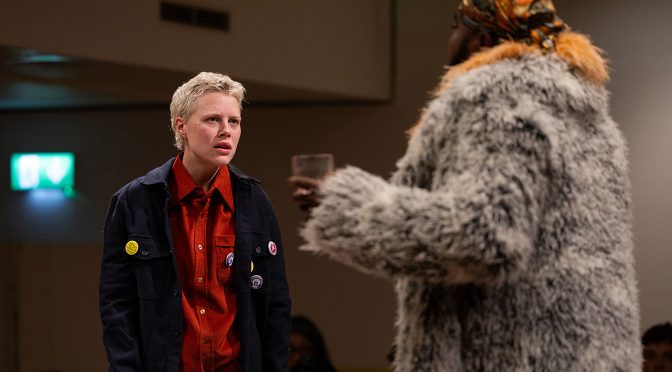While a connection between a play about gay squatters in 1970s Brixton and this location is a nice idea, as a venue for a play it is tough. The strip lighting and terrible acoustics in the room set aside for performing make watching and hearing a real effort. Director Ian Giles doesn’t help. His enthusiastic cast shouts too much, yet it is often hard to catch what’s being said.
It seems a shame not to recommend a play because of where it is staged. But that isn’t the only disappointment here. There are interesting and important ideas in On Railton Road – about housing and a gay lifestyle or identity removed from heteronormativity – that could pose an invigorating challenge. It’s radical stuff that’s worth hearing. But, regardless of your politics, Louis Rembges’ play feels too much like a lecture.
Maybe to add some fun, or to structure the play, a lot of time is taken up with a theatre group formed by some of the squatters – the Brixton Faeries. We get to see snatches of their Punch and Judy Show, or rather its rehearsal. While it’s nice to remind the kids that reclaiming a narrative isn’t new, street theatre off the street is asking for trouble and, despite puppets from Oliver James Hymans, the performances are uneven and these sections too long.
To be fair, there is personal drama that aims to put flesh on the bones of theory with a cast of characters that, even if they don’t quite convince, entertain. Jamal Franklin’s Darie stands out by far as the most charismatic, well-delivered role. But all the characters need developing, some of them urgently. Casper (played with conviction by Hannah van der Westhuysen), who toys with terrorism, is the most obvious example. Or take Marie (Aoife Smith) who, confusingly, ends up taking over the narration after being in the background. Each role is identified with a quirk athat becomes inescapable. I wonder if casting more diverse ages might have helped?
There are problems with plotting, too. There’s an endearing performance from Manish Gandhi, but his character’s story is a mystery. Meanwhile Thomas Royal’s Philip seems included because of his job as a teacher and, from this little explored plot point, ends up as a victim of violence that is subsequently (almost) forgotten about. As for the squatters’ future lives, there seems to be an obligation to document these that is horribly rushed.
If the play is just history – telling us about what happened – we don’t quite get enough context or depth. True, their lives become “fragmented”, but characters we don’t get to know well end up with truncated stories that do nobody justice. If the show wants to do more… then it fails again. Telling us what happened to the properties is also rushed to the point of being confusing. Could Railton Road be some kind of model – for housing, or for how to live? I’m not sure, and nor is the play that really should have told us.
Until 18 November 2023
Photo by Lara Dunn

